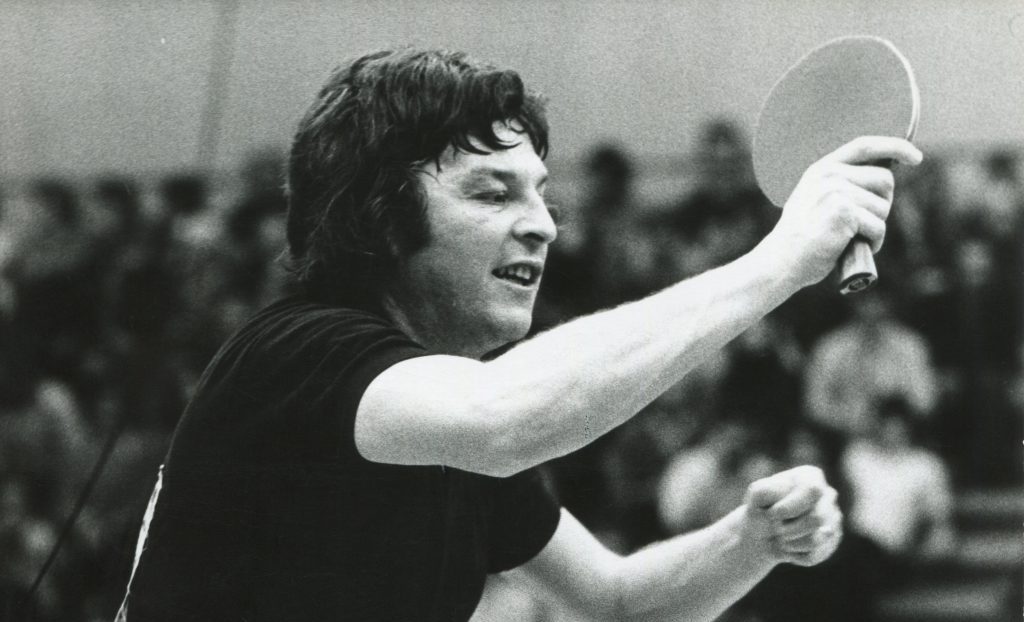Some players leave their mark through sheer brilliance. Others through longevity. Denis Neale did both – and then some.
When you’re part of the last English duo to claim an individual World Championships medal, when you’ve pulled on the England shirt nearly 500 times, when you’ve conquered Europe with your club, and when your love for the sport still drives you to coach decades later, you’ve earned the right to be called one of England’s table tennis greats.
Denis is exactly that – and he’s the subject of the latest interview in Table Tennis England’s Road to London 2026 series.
That historic World Championships medal came alongside Mary Wright in 1969 in Munich, where they battled through to the Mixed Doubles semi-finals. It’s a partnership Denis remembers with genuine fondness.
“Mary was a world-class player,” he reflects. “With Mary, we maybe won a dozen national or international tournaments. You can have a good player with another really good player, but in doubles, it’s about combining together and that’s what we did.”
The path to that bronze medal wasn’t easy. “They were all tough matches. We won the quarters, then the semis, we lost to a better pair who went on to win the title.” Simple words that mask what remains a remarkable achievement – one that no English pair has matched in the decades since.
That World Championships bronze was the crown jewel of a career studded with domestic success. Six national Men’s Singles titles tell their own story, with Denis conquering some of the era’s finest players including Ian Harrison, Chester Barnes, Nicky Jarvis and Des Douglas.
“Becoming National Champion was fantastic, I couldn’t believe it. At that time it was just a dream! After you win it once, you try to get more.”
The hunger, once awakened, was insatiable.
Like so many great sporting stories, Denis’s journey began with a chance encounter. At thirteen, playing at Newport Boys’ Club in Middlesbrough, he met a lad called Alan Ransome – a meeting that would change everything.
“I beat him! It gave me a lot of incentive to better myself. I was playing six hours a day minimum, seven days a week. I enjoyed it that much!”
That dedication, that sheer love of the game, would eventually lead to something unprecedented in English table tennis.
In 1972, Denis and his Ormesby teammates achieved what no English club had managed before or since – they won the Europe Club Cup. It remains a source of immense pride, even five decades later.
“When we had the 50th anniversary a few years ago, I was saying a speech and I started crying, then Nicky Jarvis came on and burst into tears as well. Sometimes you go to bed and you think about it.”

But Denis’s career wasn’t just about medals and trophies – it was about moments that became legends. Take that infamous dive at Crystal Palace, captured forever in a photograph that still raises smiles today.
“England used to have all of our training camps at Crystal Palace, and I’d jumped off that board hundreds of times. I said if I lost to Chester Barnes, I’d jump off that board… well I did lose to him. A lot of people were there, the press were there, and I just jumped off and everybody applauded! Nobody knew I’d done that so many times before!”
Then there was the visit to 10 Downing Street – another photo, another story that speaks to the recognition English table tennis once commanded at the highest levels of society.
Throughout our conversation, one thing shines through above all else: Denis’s unwavering love for table tennis. It’s what drove him through those six-hour daily training sessions, what carried him through nearly 500 England appearances, and what keeps him coaching today.
“I’ve done well for myself, I’ve gone from zero to a good standard of living which is good, but the most important thing is, I love table tennis.”
As we countdown to London 2026 and celebrate a century of World Championships, Denis Neale’s story reminds us why this sport captures hearts and changes lives. His journey from a thirteen-year-old in Middlesbrough to World Championships medallist embodies the dreams that drive every player who picks up a paddle.
The passion burns as bright as ever.
Still photos provided by Diane Webb, Chair of the Archives, Museum and Records Committee.
Source: Table Tennis England
